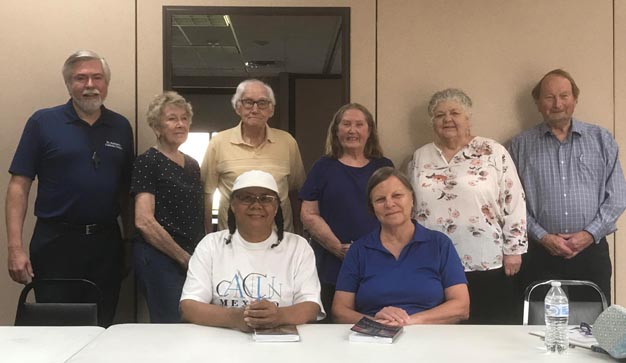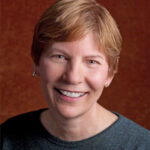
Members of the Catholic Conversation ministry at St. Anthony Parish include, front, from left, Marie Christian and Carrie Delcourt. In the back are John Cooper, Marlene Metzgar, Tom Thompson, Nancy Stone, Loxi Hopkins and Tom Hopkins.
By Carrie Delcourt
Some white people believe that racism no longer exists, so it does no good to talk about it. However, white people do not have all the answers about racism. White people should not be afraid of discussing racism and learning from the people who experience it. Racism exists in this country because most people of color say it exists. It will be over when the people who are affected by it say it is over.
We must address racism because it affects everyone, even white people who may believe otherwise. White people must reflect on how we may be harming people of color, whether we intend to or not. The most helpful book I have read about this is “Nice Racism” by Robin Diangelo. Ms. Diangelo, who was raised Catholic, gets to the heart of the issues that so many well-meaning white people need to be aware of and confront in ourselves.
I think of myself as a “good” white person for contributing to charitable activities that help people of color. But I must do more. I am bound by virtue of my baptism to do what St. Pope John Paul II said in Nairobi in 1980: “Christians … are called by God to be involved in the world in order to transform it according to the Gospel … these duties include positively contributing to the establishment of just laws and structures that foster human values.”
Being “involved in the world in order to transform it according to the Gospel” means we must have difficult conversations that lead to just laws and structures. The Catholic Conversation ministry at St. Anthony Parish in Davenport entails discussing various topics, including difficult ones such as racism. Our racism conversations began with the USCCB document, Open Wide Our Hearts. Next we discussed “Uncomfortable Conversations with a Black Man” by Emmanuel Acho and “Racial Justice and the Catholic Church” by Father Bryan Massingale. Our upcoming discussion is about “Tattoos on the Heart” by Father Gregory Boyle.
Marie, who is Black and a cradle Catholic, has helped me to see that I must learn more about American history, including oppression, enslavement and inequality. It is difficult to read about such things but it is necessary for understanding how history plays out today in the various communities to which I belong, including the Catholic Church.
White Catholics must ask ourselves why there are so few Black persons in our church. Echoing what Father Bryan Massingale wrote in “Racial Justice and the Catholic Church,” Marie said many individual white Catholics have been with Black persons through their struggles but, as a whole, the Catholic Church has not. We must acknowledge what has happened in the past and commit to doing better. One way to commit to doing better is to start a Catholic conversation on racism in your own parish. As Marie told our group, “Don’t underestimate the small positive steps you can take to make a difference.”
(Carrie Delcourt is a member of St. Anthony Parish in Davenport.)











